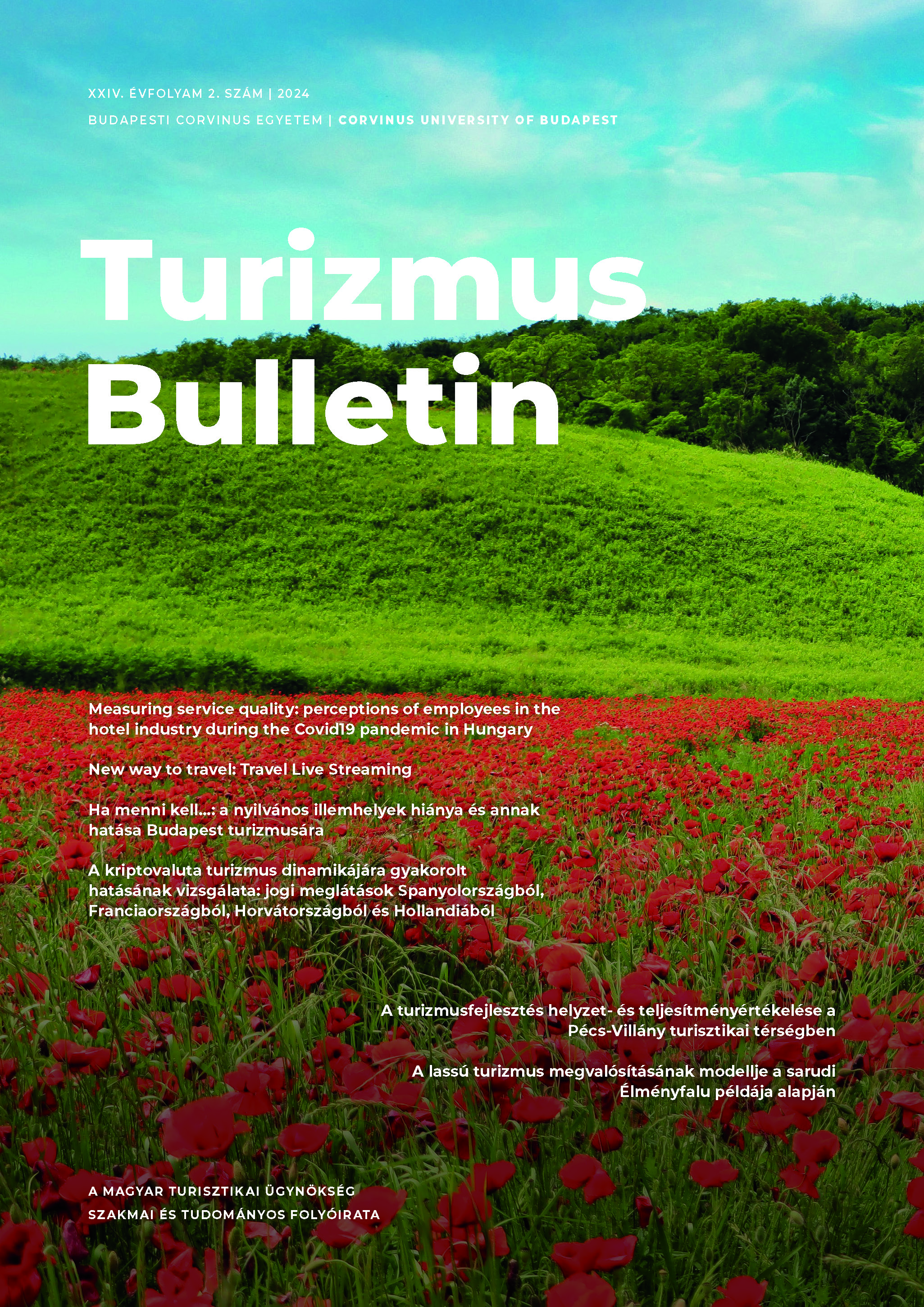Új utakon: utazás élő közvetítésben
DOI:
https://doi.org/10.14267/TURBULL.2024v24n2.2Kulcsszavak:
utazás élő közvetítése, szponzorok, streamelők, nézők, fenntarthatóságAbsztrakt
A legújabb kutatások rámutatnak a turizmus külső tényezőknek való kitettségére, beleértve veszélyes vírusokat és a bizonytalan gazdasági és társadalmi helyzetet. A Travel Live Streaming (TLS), az utazás élő közvetítése, új szabadidő eltöltési lehetőséget kínál az embereknek, továbbá a fenntarthatósági problémák enyhítésének új módját is kínálja. A TLS iránti tudományos érdeklődés növekszik, a témában születetett szakirodalom azonban csak korlátozottan áll rendelkezésre. A tanulmány célja feltárni a kínai nézők TLS-ről alkotott véleményét, valamint az eredmények alapján útmutatást adni más nemzetek szponzorai és streamelői számára, akik már használják vagy tervezik a TLS használatát. A tanulmány egyrészt kérdőív segítségével tárja fel a kínai válaszadók véleményét, másrészt félig strukturált interjúk révén nyújt mélyebb betekintést a TLS témájába. Az eredmények kimutatták a valós idejű interakciós élmény és a nézőknek a TLS alapján a termékről, illetve szolgáltatásról alkotott benyomásai közötti kapcsolatot, valamint a TLS minősége és a nézők döntései közötti kapcsolatot. Az interjúk rávilágítottak a TLS-ről alkotott véleményekre, különös tekintettel a terméknek, illetve szolgáltatásnak a valóságot eltúlzó reklámozásával kapcsolatos attitűdökre.
Hivatkozások
AYEH, J. K. (2015): Travellers’ acceptance of consumer-generated media: An integrated model of technology acceptance and source credibility theories. Computers in Human Behavior. 48. pp. 173–180. https://doi. org/10.1016/j.chb.2014.12.049
BUHALIS, D. – LAW, R. (2008): Progress in information technology and tourism management: 20 years on and 10 years after the Internet – the state of eTourism research. Tourism Management. 29(4). pp. 609–623. https:// doi.org/10.1016/j.tourman.2008.01.005
DENG, Z. – BENCKENDORFF, P. – WANG, J. (2022): From interaction to relationship: Rethinking parasocial phenomena in travel live streaming. Tourism Management. 93(4). pp. 104583. https:// doi.org/10.1016/j.tourman.2022.104583
DENG, Z. – BENCKENDORFF, P. – WANG, J. (2021): Travel live streaming: anaffordance perspective. Information Technology & Tourism. 23(2). pp. 189– 207. https://doi.org/10.1007/s40558-021-00199-1
DENG, Z. – BENCKENDORFF, P. – WANG, J. (2019): Blended Tourism Experiencescape: A Conceptualisation of Live-Streaming Tourism. Information and Communication Technologies in Tourism. pp. 212–222. https://doi. org/10.1007/978-3-030-05940-8_17
GÖSSLING, S. (2021): Tourism, technology and ICT: A critical review of affordances and concessions. Journal of Sustainable Tourism. 29(5). pp. 733–750. https://doi.org/10.1080/0966 9582.2021.1873353
GÖSSLING, S. (2017): Tourism, information technologies and sustainability: an exploratory review. Journal of Sustainable Tourism. 25(7). pp. 1024–1041. http://dx.doi.org/10.1080/09669582.2 015.1122017
HAYS, S. – PAGE, S. J. – BUHALIS, D. (2013): Social media as a destination marketing tool: its use by national tourism organisations. Current Issues in Tourism. 16(3). pp. 211–239. http://dx.doi.org/ 10.1080/13683500.2012.662215
HRUSCHKA, H. – MAZANEC, J. (1990): Computer-assisted travel counseling. Annals of Tourism Research. 17(2). pp. 208–227. https://doi. org/10.1016/0160-7383(90)90084-5
HSU, C. H. C. – KANG, S. K. – LAM, T. (2006): Reference group influences among Chinese travellers. Journal of Travel Research. 44(4). pp. 474–484. https://doi.org/10.1177/0047287505282951
HU, M. – ZHANG, M. – WANG, Y. (2017): Why do audiences choose to keep watching on live video streaming platforms? An explanation of dual identifcation framework. Computers in Human Behavior. 75. pp. 594–606. https://doi. org/10.1016/j.chb.2017.06.006
HVASS, K. A. – MUNAR, A. M. (2012): The takeoff of social media in tourism. Journal of Vacation Marketing. 18(2). pp. 93–103. https://doi. org/10.1177/1356766711435978
IUNIUS, R. F. – CISMARU, L. – FORIS, D. (2015): Raising Competitiveness for tourist destinations through information technologies within the newest tourism actionframework proposed by the european commission. Sustainability. 7(9). pp. 12891–12909. https://doi.org/10.3390/su70912891
LEUNG, D. – LAW, R. – HOOF, H. – BUHALIS, D. (2013): Social media in tourism and hospitality: a literature review. Journal of Travel & Tourism Marketing. 30(1-2). pp. 3–22. https://doi.org/10.1 080/10548408.2013.750919
LIBURD, J. (2005): Sustainable tourism and innovation in mobile tourism services. Tourism Review International. 9(1). pp. 107–118. https:// doi.org/10.3727/154427205774791771
LIN, K. – FONG, L. H. N. – LAW, R. (2022): Live streaming in tourism and hospitality: a literature review. Asia Pacific Journal of Tourism Research. 27(3). pp. 290–304. https://doi.org/10.1 080/10941665.2022.2061365
LITVIN, S. W. – GOLDSMITH, R. E. – PAN, B. (2008): Electronic word-of-mouth in hospitality and tourism management. Tourism Management. 29(3). pp. 458–468. https://doi.org/10.1016/j. tourman.2007.05.011
LIU, X. – YUAN, Y. – HE, J. – LI, Z. (2022): Framing the travel livestreaming inChina: a new star rising under the COVID-19. Current Issues in Tourism. 25(24). pp. 3933–3952. https://doi.org/1 0.1080/13683500.2021.2023115
POON, A. (1993): Tourism, technology and competitive strategies. CAB International, Wallingford.
THORBURN, E. D. (2014): Social media, subjectivity, and surveillance: moving on from occupy, the rise of live streaming video. Communication and Critical/Cultural Studies. 11(1). pp. 52–63. https://doi.org/10.1080/147914 20.2013.827356
XIANG, Z. – GRETZEL, U. (2010): Role of social media in online travel information search. Tourism Management. 31(2). pp. 179–188. https:// doi.org/10.1016/j.tourman.2009.02.016
YUAN, Y. – TSENG, Y. H. – HO, C. I. (2018): Tourism information technology research trends: 1990– 2016. Tourism Review. 74(1). pp. 5–19. https://doi. org/10.1108/TR-08-2017-0128
ZHANG, W. – WANG, Y. – ZHANG, T. (2021): Can “Live Streaming” really drive visitors to the destination? From the aspect of “Social Presence”. SAGE Open. 11(1). https://doi. org/10.1177/21582440211006691

